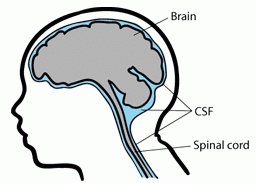Bacterial meningitis is a medical emergency.
Untreated, meningitis can be fatal in a few hours. Survivors may have severe consequences

including varying degrees of blindness, deafness, paralysis and mental retardation. Suspected cases of meningitis require immediate medical attention.
Meningitis is the inflammation of the lining around the brain and spinal cord. Different germs can cause it, bacteria or viruses and sometimes fungi.
How it Spreads
Meningitis spreads through close contact, like a cold or flu. Coughing or sneezing, sharing eating utensils, kissing and close physical contact can spread the germs from person to person. We may carry the germs that cause meningitis without realizing. Because it is difficult if not impossible to stop the transmission of germs, especially among children, prevention becomes an important consideration.
Diagnosis
Only a medical professional can properly diagnose meningitis, usually by analyzing a sample of spinal fluid from the patient.
Symptoms
Prevention
Vaccines. Different vaccines can protect us against causes of meningitis. They are not all the same. Some protect against a broader spectrum of bacteria than others.
Good Health. A healthy immune system protects us well from most causes. Often we carry some of the germs that cause meningitis with no ill effects. People whose immune systems are compromised because of HIV, cancer treatment, organ transplant, infection or other causes are more susceptible.
Diligence. Seeking medical attention as soon as the symptoms appear is vital. Parents should particularly be aware of the symptoms in infants and young children because they often appear mildly but can quickly and alarmingly escalate. Meningitis strikes more often in cold weather so it is important to be even more careful in the winter.
